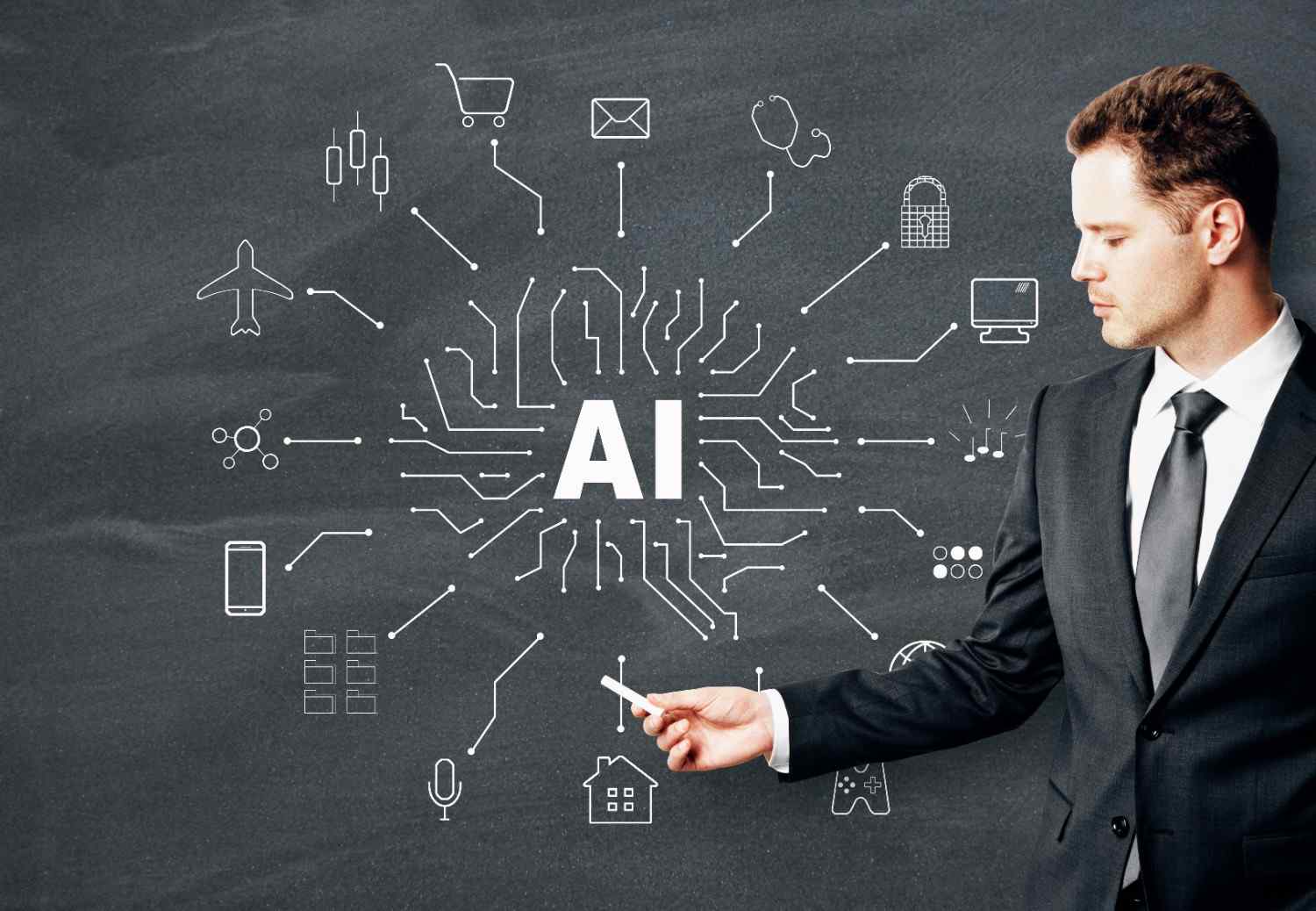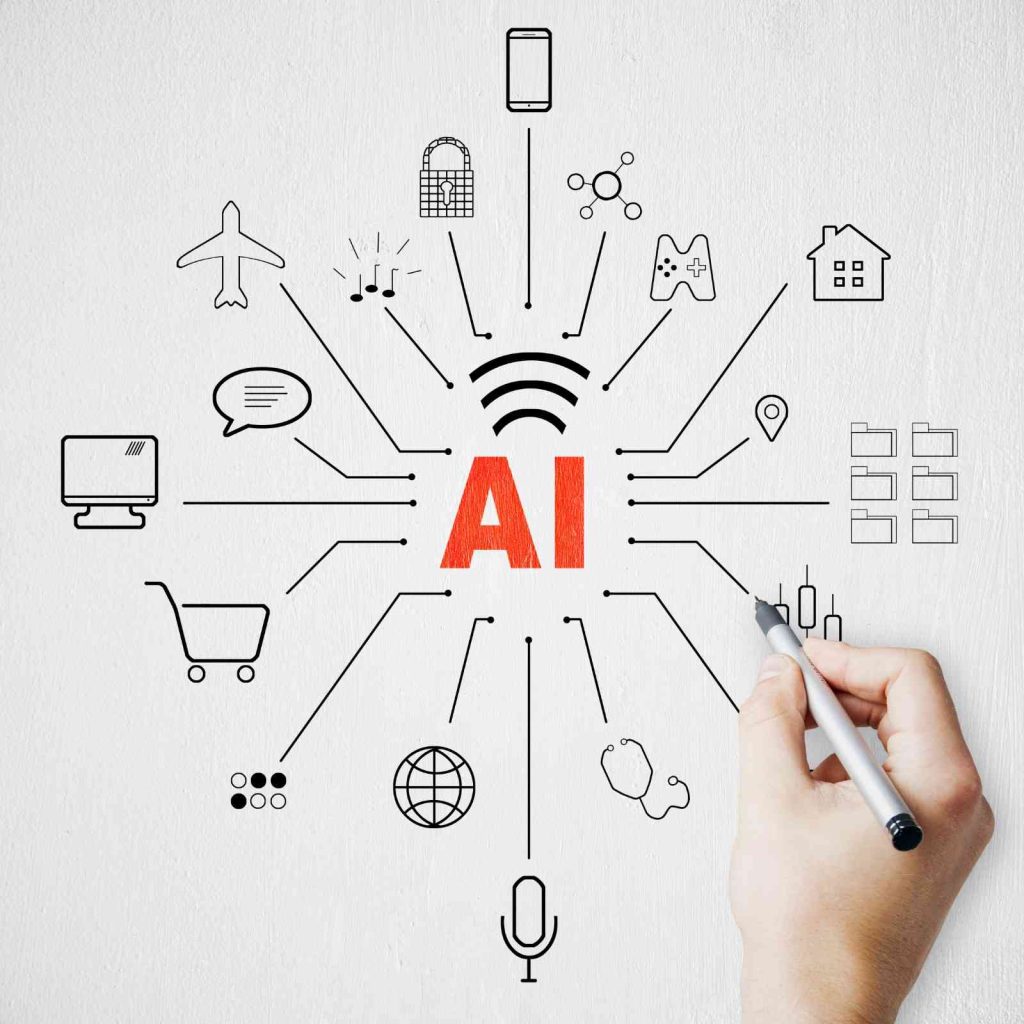
Artificial Intelligence (AI) has evolved from a futuristic concept into an essential tool in digital marketing, transforming how businesses personalize campaigns, predict customer behavior, and optimize ad spend. By leveraging AI in digital marketing, marketers can harness data-driven insights to enhance performance, streamline operations, and deliver measurable ROI, making it a cornerstone of modern strategies.
By the year 2025, AI is an established component of digital strategy, with brands using it to make quicker and smarter decisions. This blog will discuss 12 power transformative AI in digital marketing application cases driving innovation, hyper-personalization and creating a new level of marketing brilliance.
1. Predictive Analytics
Predictive analytics is one of the most effective AI applications in the digital marketing use case scenarios that can allow the brand to foresee what the customer needs prior to their articulation. Through the history, including the history of browsing, purchase patterns, as well as the history of interaction, AI algorithms can determine which prospects are most likely to convert or churn.
As an example, a subscription company may apply predictive analytics to identify users who are at risk of cancellation to provide the marketing team with the opportunity to provide them with specific retention deals. This does not only save money but also increases customer loyalty. Briefly, predictive analytics assists marketers to switch the reactive to proactive marketing strategies.
2. Personalized Recommendations
This AI in digital marketing use case has enabled Amazon, Netflix, and Spotify, which are e-commerce giants, to create complete ecosystems. These kinds of personalized recommendation engines scan through user activity to provide services such as products, shows or music recommendations that appear uniquely tailored to the individual.
The result? Increased involvement, extended periods of sessions, and higher rates of conversion. Although the AI-based personalization tools offered by smaller brands can also be used to achieve the same results, monitoring customer preferences and dynamically changing the content of the websites or emails in real time.
3. Dynamic Pricing
One of the most lucrative AI in the digital marketing application is dynamic pricing as it applies to e-commerce and travel sectors. AI systems automatically scan the market data, their competitor pricing, inventory, and customer demand to guide the system to adjust prices.
To illustrate this case, airlines and ride-hailing services such as Uber apply AI algorithms to adjust prices by changing the demand during the time. Companies that have adopted this approach are able to stay competitive and at the same time take advantage of their profits-pricing decisions will be informed and responsive to the market environment.

4. Conversational AI and Chatbots
Chatbots no longer rely on a set of scripted answers. Conversational AI is offering a new opportunity to brands to offer intelligent, round-the-clock customer service that is almost human. The AI application in digital marketing use case is simplifying customer service processing orders and inquiries and assisting with making decisions regarding purchases without any human support.
As an example, a chat-bot on a shopping website may suggest a product to a client depending on their previous search or purchase. The possibility to deliver immediate support enhances the user experience, decreases waiting time, and user satisfaction.
5. Sentiment Analysis
The amount of unstructured information that is produced on social media and online reviews is immense each day. Another important AI application in digital marketing use cases is sentiment analysis, which is based on natural language processing (NLP) to understand the feelings behind user comments, mentions or feedback.
Brands can easily establish the opinion of the people regarding a new campaign or product introduction. Whenever sentiment is negative, marketers are able to act promptly, make changes in messaging, and save brand reputation. The technology makes the businesses have an advantage of real time customer perception.
6. Automated Email Campaigns
Email still has a strong channel when it is done in a strategic manner. AI goes a notch higher automating personalization, timing and targeting. This is among the most common AI that is used in digital marketing applications.
Artificial intelligence tools such as HubSpot and Mailchimp are able to segment audiences automatically, anticipate the best times to send an email, and create subject lines that would produce the highest open rates. What is created is smarter, more relevant communication which cultivates leads without human supervision and saves teams time and enhances campaign performance.
7. Ad Optimization and Ad Targeting
Advertising can be expensive and competitive, and AI can change it to a precision-oriented process. This is a digital marketing use case of AI that uses real-time analytics to identify the most performing audience segments and automatically bid, create creatives, and place ads.
Google Ads and Meta Ads Manager are already applications of machine learning to improve targeting but third-party AI tools are now available to give even more insight. Through constant testing and learning, AI can help you achieve the maximum possible return on investment by spending on ads.
8. Voice Search Optimization
The proliferation of intelligent appliances, such as Alexa, Google Assistant, and Siri, has altered the process of information search by the users. Voice search optimization has become one of the crucial AIs in digital use cases of marketing.
Artificial intelligence (AI) provides query processing in natural language by assisting marketers in developing conversational content that matches the way people converse as opposed to the way they type. Voice optimization also increases accessibility that enables the brands to reach audiences via hands-free devices at home or on the move.
9. Social Media Visual Recognition
Another developing AI in the use case of digital marketing is visual recognition. Image processing applications that are driven by AI are capable of identifying objects, logos or even feelings in pictures or videos.
To illustrate, a brand may monitor the number of times that its logo is mentioned in user-created content or quantify the response of the audience to visual campaigns. The information assists marketers to refine creative approaches so that visual messages can make a positive impact on the target demographic.
10. SEO Content Optimization
Ai has brought change to SEO as it has eliminated the use of guesswork with data intelligence. This AI in digital marketing applications can be seen through such tools as Clearscope, MarketMuse, and SurferSEO.
They examine the purpose of key words, the aspects of content richness and readability to enable the marketers to write optimized articles that satisfy the needs of both the search engine and the human beings. Rather than being guided by intuition only, teams may employ AI insights to schedule content calendars, enhance rankings and keep visibility steady.
11. Customer Journey Mapping
AI-driven customer journey mapping gives the marketer an overview of the user experience at every touchpoint on a global scale. This is a use case of critical AI in digital marketing that assists in discovering the places where the prospects fail and what they actually do to convert.
As an example, an AI platform can integrate CRM data, website analytics, and campaign metrics in order to chart the perfect buyer journey. These learnings allow marketers to make follow-ups more personal and design continuous omnichannel experiences that allow customers to effortlessly transition between awareness and purchase.
12. Fraud Detection
Digital advertising fraud costs businesses billions annually. AI-driven fraud detection systems monitor patterns in ad clicks, impressions, and transactions to identify suspicious or bot-driven activity. This vital AI in digital marketing use case safeguards budgets, ensures campaign authenticity, and maintains data integrity.
By using AI, marketers can detect anomalies faster and take corrective action before significant financial loss occurs. This helps maintain transparency and accountability in digital ad ecosystems.
FAQs
1. How is AI improving personalization in marketing?
AI enhances personalization by collecting and analyzing behavioral, transactional, and demographic data to craft individualized experiences. From recommending products to sending dynamic email content, it adapts to user preferences in real time. This personalization, one of the most influential AI in digital marketing use cases, drives engagement, retention, and lifetime customer value while reducing campaign fatigue.
2. Will AI replace human marketers?
No. While AI handles repetitive, data-heavy tasks such as analytics, optimization, and segmentation, human creativity remains irreplaceable. Strategic thinking, emotional storytelling, and cultural understanding are uniquely human strengths. The most successful adoption of AI in digital marketing use cases happens when marketers use AI as an intelligent assistant, augmenting, not replacing, human expertise.
Final Thoughts
AI is no longer an experimental technology, it’s a core element of modern marketing success. From predictive analytics to fraud detection, every AI in digital marketing use case delivers measurable impact, improving efficiency and insight across campaigns.
Marketers who embrace AI now are future-proofing their organizations for a data-driven world. The takeaway is simple: AI doesn’t just make marketing smarter, it makes it human at scale. By blending creativity with machine intelligence, businesses can unlock personalization, precision, and profitability like never before.




